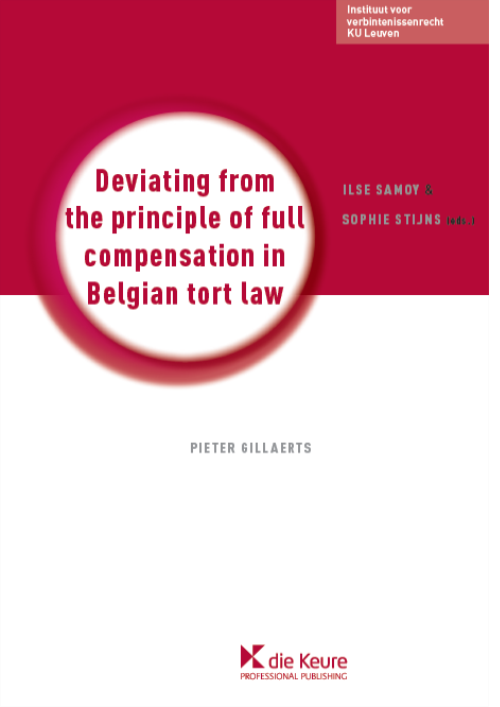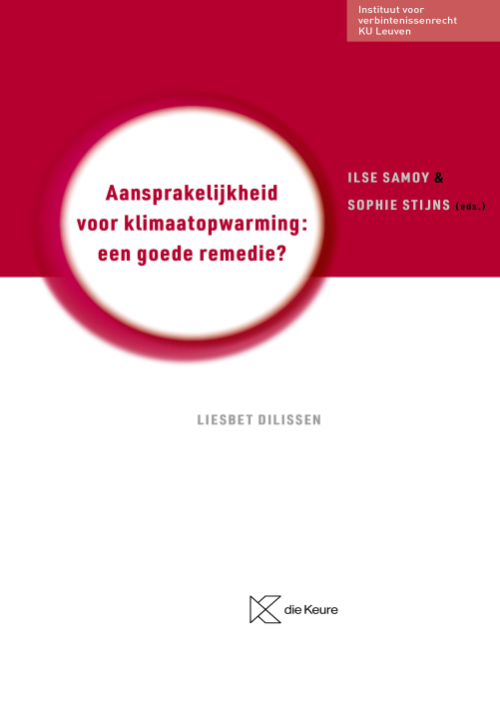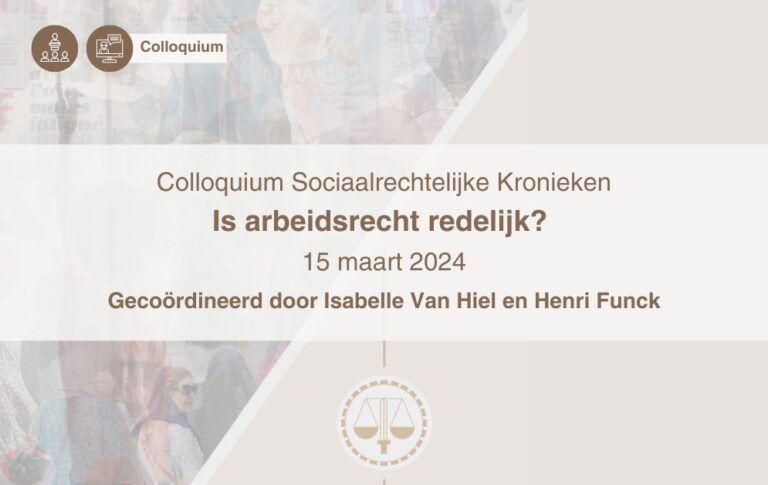
Deviating from the principle of full compensation in Belgian tort law
As an exception to the rule that the loss lies where it falls, tort law shifts the loss on the basis of the tortfeasor’s responsibility. Key to the scope of the redress is the fundamental principle of full compensation. It is based on a traditional balancing of interests, where the interest of the innocent victim prevails over the interest of the guilty person. Yet, our increasingly complex society and the wide array of deviations calls for a reassessment of the absolute nature of the 200-year-old principle of full compensation. What if it becomes completely unfair to award a full compensation? How does one take into account that strict liabilities also spread the loss instead of merely shifting it?
Belgian tort law is faced with a major incoherence today. The principle of full compensation is confronted with numerous deviations. Although, in theory, the entire loss should be compensated without any possibility for the judge to moderate, in reality, different legal actors such as the legislator and the judge have tried to find solutions for unfair situations resulting from this principle of full compensation. For example, judges moderate on improper grounds for lack of an appropriate tool to moderate. This thesis has transcended the fragmentation and incoherent compartmentalisation by taking a bird’s-eye view. The tension between the absolute principle of full compensation and the numerous deviating systems is assessed by analysing important deviating systems and comparing Belgian law to Dutch and French law.
€69
Auteurs
Productspecificaties
Inhoud
INTRODUCTION
1. Research aim and delineation
2. Research questions and methods
3. Thesis design
PART 1. ESTABLISHING THE MEANING OF THE PRINCIPLE OF FULL COMPENSATION
- CHAPTER 1. GRAMMATICAL INTERPRETATION
- CHAPTER 2. HISTORICAL INTERPRETATION VIA THE TRAVAUX PREPARATOIRES
- CHAPTER 3. HISTORICAL MEANING OF THE PRINCIPLE
PART 2. PRINCIPLE OF FULL COMPENSATION ANNO 2016
- CHAPTER 1. FROM MONO- TOWARDS MULTIPILLARED COMPENSATION LAW 35
- CHAPTER 2. ABSOLUTE PRINCIPLE OF FULL COMPENSATION AS A MATTER OF PRINCIPLES ITSELF
Section 1. Ravages of time
Section 2. Faute n’oblige plus? The principle of smallest harm
Section 3. Fault, risk and alterity
Section 4. Plea for a competence to moderate - CHAPTER 3. DOCTRINAL AND JURISPRUDENTIAL VIEW ON FULL COMPENSATION AND IN CONCRETO APPRECIATION OF LOSS
PART 3. CATEGORISATION AND ANALYSIS OF DEVIANT SYSTEMS
- CHAPTER 1. DEVIATIONS BY THE LEGISLATOR
Section 1. Capped liabilities
Section 2. Franchise in the Law on Product Liability
Section 3. Considering more than merely the loss
Section 4. Statutory competence to moderate - CHAPTER 2. JURISPRUDENTIAL DEVIATIONS
Section 1. Appreciation ex aequo et bono and extrapatrimonial loss
Section 2. Doctrine of the prohibition of abuse of the law - CHAPTER 3. OTHER DEVIATIONS: INDICATIVE TABLE(S)
PART 4. FROM COMPARTMENTALISATION OVER COMMUNALITY TO MORE COHERENCE
- CHAPTER 1. PROBLEM OF COHERENCE
- CHAPTER 2. SEARCH FOR COMMUNALITY
- CHAPTER 3. TOWARDS A NEW FRAMEWORK
SUMMARISING CONCLUSION
BIBLIOGRAPHY
- Belgium
- France
- The Netherlands
- Others
SUBJECT INDEX
TRANSLATION LIST
Volledige omschrijving
As an exception to the rule that the loss lies where it falls, tort law shifts the loss on the basis of the tortfeasor’s responsibility. Key to the scope of the redress is the fundamental principle of full compensation. It is based on a traditional balancing of interests, where the interest of the innocent victim prevails over the interest of the guilty person. Yet, our increasingly complex society and the wide array of deviations calls for a reassessment of the absolute nature of the 200-year-old principle of full compensation. What if it becomes completely unfair to award a full compensation? How does one take into account that strict liabilities also spread the loss instead of merely shifting it?
Belgian tort law is faced with a major incoherence today. The principle of full compensation is confronted with numerous deviations. Although, in theory, the entire loss should be compensated without any possibility for the judge to moderate, in reality, different legal actors such as the legislator and the judge have tried to find solutions for unfair situations resulting from this principle of full compensation. For example, judges moderate on improper grounds for lack of an appropriate tool to moderate. This thesis has transcended the fragmentation and incoherent compartmentalisation by taking a bird’s-eye view. The tension between the absolute principle of full compensation and the numerous deviating systems is assessed by analysing important deviating systems and comparing Belgian law to Dutch and French law.
Anderen bekeken ook
Blijf op de hoogte van relevante informatie, recente publicaties en opleidingen.
Schrijf u in op onze nieuwsbrief.
Nieuwsberichten
Blijf op de hoogte van de laatste ontwikkelingen en nieuwe updates.














